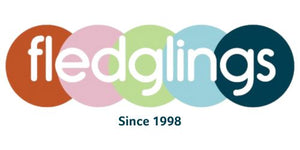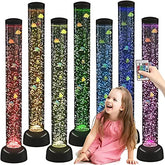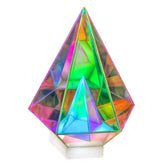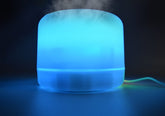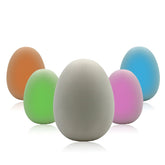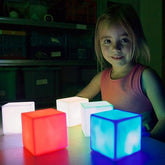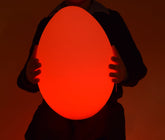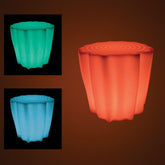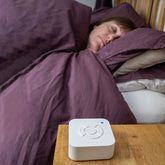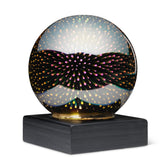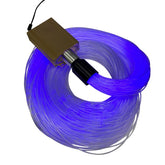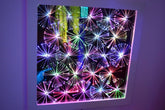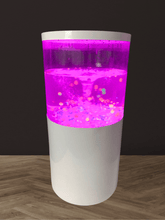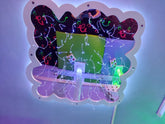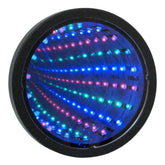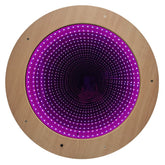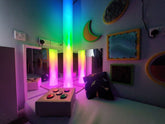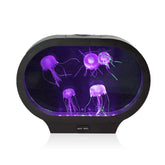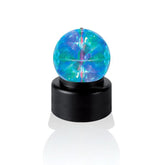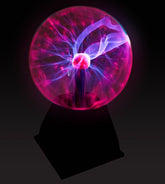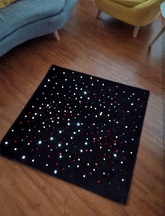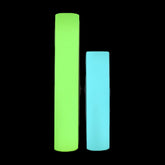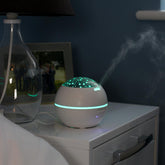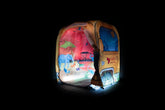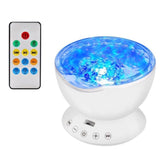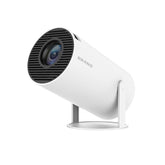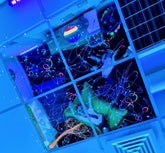Sensory Lighting
Sensory lighting can be a valuable tool for children with special educational needs, providing a calming and stimulating environment that can help promote relaxation, focus, and learning. Sensory lights can help children with autism and come in a variety of forms, including lamps, projectors, and light panels, and can be used in various settings, such as home, classrooms or therapy rooms.
Filter
37 results
30
- 10
- 15
- 20
- 25
- 30
- 50
Alphabetically, A-Z
- Featured
- Best selling
- Alphabetically, A-Z
- Alphabetically, Z-A
- Price, low to high
- Price, high to low
- Date, old to new
- Date, new to old
Sort
Sort by:
- Featured
- Best selling
- Alphabetically, A-Z
- Alphabetically, Z-A
- Price, low to high
- Price, high to low
- Date, old to new
- Date, new to old
-
3.3ft Bubble Tube Floor Lamp
Perfect for any calming or interactive sensory room, the Bubble Tube Floor Lamp captivates with its array of changing colours, moving bubbles, and mesmerizing fish. It’s especially popular with individuals who have Sensory Processing Disorder (SPD), as it creates a soothing, positive response. The...- £63.99 (£76.79 inc VAT)
- £63.99 (£76.79 inc VAT)
- (-0%)
- Unit price
- / per
-
Black
-
White
-
3D Diamond Prism Light
Enhance any sensory room with the captivating 3D Diamond Prism Light. This exquisite light feature creates a mesmerising, colour-changing illusion that adds a magical touch to any environment. Key Features: Magical Colour-Changing Illusion: The 3D Diamond Prism Light dazzles with a stunning display of...- £16.99 (£20.39 inc VAT)
- £16.99 (£20.39 inc VAT)
- (-0%)
- Unit price
- / per
-
Colour Changing Aroma Diffuser (Bluetooth & Speaker)
You choose the mood and set the atmosphere, have a party or create a calming sensory environment the device can be wirelessly linked to your phone and connected to music through Bluetooth. Children and adults will love the different colours and as an added...- £41.99 (£50.39 inc VAT)
- £41.99 (£50.39 inc VAT)
- (-0%)
- Unit price
- / per
-
Colour Changing Egg
Add atmosphere and ambience to any room in an instant with a Colour Changing Egg. These unusual egg-shaped lights glow and change colour gently between 6 colours. . Great to help create a relaxing and calming environment. . Sensory light up mood egg. Gradually colour changing...- £3.99 (£4.79 inc VAT)
- £3.99 (£4.79 inc VAT)
- (-0%)
- Unit price
- / per
-
Colour Changing Mood Block
Enhance any space with the gentle, soothing glow of our Colour Changing Mood Blocks. Perfect for sensory lighting or creating a relaxing ambiance, these cubes are sure to captivate and delight. Experience the magic of colour-changing illumination and elevate your surroundings with ease. Key...- £3.99 (£4.79 inc VAT)
- £3.99 (£4.79 inc VAT)
- (-0%)
- Unit price
- / per
-
Colour Changing Mood Cube Stool
Calm Your Mind using Colour Changing Sensory Light up Furniture The colour changing furniture is an amazing kid-friendly night light that can be ideal for your children’s rooms. It has calming properties that are perfect for sensory rooms. This colour changing furniture is durable, and versatile...- £95.99 (£115.19 inc VAT)
- £95.99 (£115.19 inc VAT)
- (-0%)
- Unit price
- / per
-
Colour Changing Mood Large Egg
The colour changing large egg is an amazing child-friendly calming mood light. It has calming properties that are perfect for sensory rooms. This colour changing furniture is durable, and versatile which makes it a perfect product. The lights can be changed up to 6...- £52.49 (£62.99 inc VAT)
- £52.49 (£62.99 inc VAT)
- (-0%)
- Unit price
- / per
-
Colour Changing Tree Trunk
This colour changing tree trunk comes with a remote control, through which you can set up to 6 different colours. They are calming to look at and the colours fade evenly along the whole shape. This sensory light up tree trunk can help distract a...- £99.99 (£119.99 inc VAT)
- £99.99 (£119.99 inc VAT)
- (-0%)
- Unit price
- / per
-
Compact Dream light
The Compact Dreamlight is a sensory aid that can help alleviate insomnia, stress, anxiety, depression, and tinnitus. It is a beamed ceiling light that pulses and dims, creating a calming and relaxing atmosphere that promotes sleep. Particularly helpful for children with ASD or autism,...- £28.99 (£34.79 inc VAT)
- £28.99 (£34.79 inc VAT)
- (-0%)
- Unit price
- / per
-
Fibre Ball LED Sensory Night Light - 12cm
The Fibre Ball LED Sensory Night Light is a mesmerising addition to any room, creating a calming and colourful atmosphere. Perfect for children and young adults with sensory needs, it features a mirrored ball with a stunning LED starburst effect that captivates and soothes....- £16.49 (£19.79 inc VAT)
- £16.49 (£19.79 inc VAT)
- (-0%)
- Unit price
- / per
-
Fibre Optic Sensory Light System
Let the magic of our Fibre Optic Sensory Light bring tranquility and wonder to your space. Key Features: Immersive Visual Stimulation: Immerse yourself in a captivating display of color-changing lights, offering exciting visual stimulation that is both calming and enchanting. The soft glow of...- £158.49 (£190.19 inc VAT)
- £158.49 (£190.19 inc VAT)
- (-0%)
- Unit price
- / per
-
Fiesta Sensory Ceiling Tiles
Fiesta Sensory Ceiling Tiles – Elevate Your Space with Calming Sensory Bliss Discover a world of tranquillity with our Fiesta Sensory Ceiling Tiles, proudly crafted in the UK. Immerse yourself in the enchanting dandelion fiber optic effect, creating a soothing colour-changing ambiance that transforms...- £829.99 (£995.99 inc VAT)
- £829.99 (£995.99 inc VAT)
- (-0%)
- Unit price
- / per
-
Floor Standing Tornado
Create a mesmerising sensory experience with this Tornado Tube, designed to engage and stimulate through colour, movement, and sound. As the swirling water forms a tornado effect, the included beads race around the column, adding a dynamic layer of visual excitement. Ideal for children...- £499.99 (£599.99 inc VAT)
- £499.99 (£599.99 inc VAT)
- (-0%)
- Unit price
- / per
-
Fluff Cloud Panel
Transform your sensory space with the exclusive Fluff Cloud Panel from Sense Sensory! This stunning ceiling feature uses twinkling fibre optics, and RGB LED colour-changing lights to create a calming and magical atmosphere. The mirrored effect enhances the overall ambience, making it a soothing...- £2,058.49 (£2,470.19 inc VAT)
- £2,058.49 (£2,470.19 inc VAT)
- (-0%)
- Unit price
- / per
-
Funhouse Mirrors – Set of 3
Bright, bold, and beautifully bendy — the Funhouse Mirrors – Set of 3 brings joyful distortion and vibrant colour to any space. Designed with sensory exploration in mind, each mirror curves at various angles and reflects in playful, layered colours. Ideal for sensory rooms,...- £224.99 (£269.99 inc VAT)
- £224.99 (£269.99 inc VAT)
- (-0%)
- Unit price
- / per
-
Infinity Mirror
The mirror is brilliant for children or adults with Sensory processing issues or those who are visually impaired. Children will love playing with the mirror and also enjoy the captivating lights which bring joy and tranquillity. Features: Captivating light up infinity mirror. Gives user...- £15.99 (£19.19 inc VAT)
- £15.99 (£19.19 inc VAT)
- (-0%)
- Unit price
- / per
-
Infinity Mirror Tile With Remote
Giving the illusion of infinite depth and light, these high-quality and unique tiles offer an excellent visual light-up experience that will encourage the person to move around to see the effects. Visual sensory stimulation is beneficial for helping develop social skills and hand-eye coordination, as...- £156.49 (£187.79 inc VAT)
- £156.49 (£187.79 inc VAT)
- (-0%)
- Unit price
- / per
-
Interactive Colour Creation Tube
Introducing the Colour Creation Tube, a stunning, maintenance-free sensory solution for your Sensory Room or space. Perfectly suited for children with SEND (Special Educational Needs and Disabilities) or Sensory Processing Disorder, this tube offers a dynamic range of sensory effects to support sensory stimulation...- from £939.99 (£1,127.99 inc VAT)
- from £939.99 (£1,127.99 inc VAT)
- (-0%)
- Unit price
- / per
-
Jelly Fish Tank Desktop-Oval Shaped
Captivating & mesmerizing jelly fish tank featuring jellyfish swimming with uncanny lifelike motion. Creates a calm and soothing atmosphere anywhere. Features: LED lights – phases through colours or set to one Features 5 jellyfish Minimalist oval ellipsoid design Near Silent Motors Powered by UK...- £83.49 (£100.19 inc VAT)
- £83.49 (£100.19 inc VAT)
- (-0%)
- Unit price
- / per
-
Kaleidoscope Rotating Disco Ball
A fun and mesmorising ball that rotates to shine colours in directions to produce a complex light display thanks to the mulifaceted surface. Viewers will experience beams of light flashing all over the room in constantly changing beautiful patterns. Product Features: Mini Disco Light. Multi coloured light effect....- £8.49 (£10.19 inc VAT)
- £8.49 (£10.19 inc VAT)
- (-0%)
- Unit price
- / per
-
Large Plasma Ball – 8 inch
Unleash an electrifying interactive light show with the Large Plasma Ball – 8 Inch! This mesmerising sensory tool responds to your touch, creating streaks of lightning that dance across the inside of the glass sphere. Simply pass your hands over the surface, and watch...- £32.49 (£38.99 inc VAT)
- £32.49 (£38.99 inc VAT)
- (-0%)
- Unit price
- / per
-
LED Sensory Carpet
Carpet filled with colour changing LED’s giving a starry calming vision that can be activated upon touch. This LED Carpet uses tiny lights to illuminate the black carpet with galaxy of bright and vibrant colour. This is fantastic in creating a calming sensory experience...- £187.49 (£224.99 inc VAT)
- £187.49 (£224.99 inc VAT)
- (-0%)
- Unit price
- / per
-
Light Up Cylinder
Introducing our Colour Changing Light-Up Cylinder, the epitome of captivating mood lighting that seamlessly blends functionality and style. Available in two versatile sizes, 70cm and 100cm, this mesmerising piece is designed to elevate your sensory experience, both indoors and outdoors.Key Features: Remote-Controlled Brilliance: Effortlessly...- from £124.99 (£149.99 inc VAT)
- from £124.99 (£149.99 inc VAT)
- (-0%)
- Unit price
- / per
-
Medium UV Kit
The Medium UV Kit is a captivating assortment of glow-in-the-dark toys that provide an extraordinary sensory experience. When exposed to UV light in a dark, enclosed area, these toys glow, creating stimulating visual effects and offering children a unique understanding of light and colour....- £74.99 (£89.99 inc VAT)
- £74.99 (£89.99 inc VAT)
- (-0%)
- Unit price
- / per
-
Nature Sound Pyramid
It's ideal for restless sleepers, shift workers and children who don't like the dark, and is great at providing relaxing relief from Tinnitus. Can be used as a light without the sound too. We have had fantastic feedback from parents, who say the pyramid has been vital...- £19.99
- £19.99
- (-0%)
- Unit price
- / per
-
Night Light Humidifier
Help your child with Special Educational Needs (SEN) or Additional Learning Needs (ALN) relax and sleep better with our Colour-Changing Essential Oil Diffuser and Humidifier. This multifunctional device combines soothing aromatherapy with a calming colour-changing light show, creating a peaceful environment perfect for bedtime....- £24.99 (£29.99 inc VAT)
- £24.99 (£29.99 inc VAT)
- (-0%)
- Unit price
- / per
-
PODSpop - Themed Pop-Up Play Tent
Choose from one of four themed Pop-Up Play Tents. These tents ares equipped with built-in sensory lighting that creates an immersive experience. With the mobile app, PODS Play, you'll have access to a library of audiobooks, e-books, and sound effects that will take the adventure to the...- £207.49 (£248.99 inc VAT)
- £207.49 (£248.99 inc VAT)
- (-0%)
- Unit price
- / per
-
Portable Ocean Wave Projector With Sounds & Speaker
Transform any space into a calming seascape with the Portable Ocean Wave Projector With Sounds & Speaker. This compact and USB-charged device combines soothing wave-like light projections with built-in audio to create an immersive sensory experience. Ideal for bedrooms, sensory rooms, or quiet corners,...- £27.49 (£32.99 inc VAT)
- £27.49 (£32.99 inc VAT)
- (-0%)
- Unit price
- / per
-
Sensory Projector
Create a captivating sensory environment with this ultra-portable mini sensory projector, designed to bring sensory rooms to life in schools, therapy settings, and homes. This projector provides instant visual stimulation to engage and calm users, ideal for enhancing sensory experiences. Powered by Android, it’s...- £314.99 (£377.99 inc VAT)
- £314.99 (£377.99 inc VAT)
- (-0%)
- Unit price
- / per
-
Shimmer n Shine Star Ceiling Panels
Elevate your environment into a celestial masterpiece with Shimmer n Shine Star Ceiling Panels. These innovative panels are designed to create a captivating sensory effect from above, turning ordinary spaces into starlit wonders. Crafted with meticulous attention to detail, each panel measures 59cm x...- from £584.99 (£701.99 inc VAT)
- from £584.99 (£701.99 inc VAT)
- (-0%)
- Unit price
- / per
